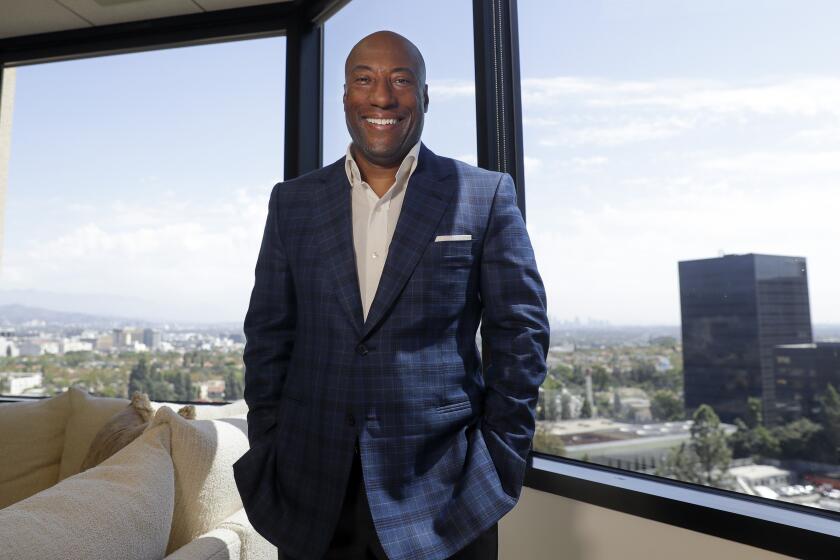A Tough Sell : Street Vendors and Merchants Wage Battle Over Pushcarts Along Rodeo Drive
- Share via
Ritzy Rodeo Drive already is home to Gucci, Chanel, Polo and Tiffany & Co.--but is it ready for pushcarts?
Some Beverly Hills officials and merchants believe pushcarts, offering everything from espresso to flowers to tourist trinkets, would spur the local economy. The carts, they say, would encourage shoppers to spend more time in the city’s business district--and buy more from the stores.
“The city has been too antiseptic for too long. Beverly Hills needs color,” declared Milton Weiss, owner of The Players, a restaurant on Rodeo Drive. Attorney Murray Fischer, who has represented local retailers agrees: “Vending carts add excitement and can enliven an area.”
But in the city’s upscale shopping district, nicknamed the Golden Triangle, the prospect of carts cruising the streets makes some retailers cringe.
“(The carts) are not in keeping with the retail we’ve established here,” said attorney Gerald Polone, who represents some Rodeo Drive merchants. “On Rodeo Drive, there is no place to grab just a cup of coffee, a Coke, or a croissant. And there never can be because of the cost.”
Currently, the city bans all vending outside permanent structures. That, in effect, has amounted to a ban on pushcart sales on both private and public property. Following inquiries by some merchants, however, the city’s Planning Commission is discussing the possibility of changing that policy, consulting merchants, residents and prospective vendors. The commission plans to review staff proposals on the issue in a meeting May 25.
With two hearings held so far, the most vocal opposition has come on the question of whether to allow pushcarts on public property.
Polone asserts that Rodeo Drive’s 12-foot-wide sidewalks are too narrow to comfortably accommodate pedestrians and pushcarts, which he says are typically three feet wide.
Meanwhile, some merchants, saying they pay a “fortune” to lease space on high-visibility Rodeo Drive, told planning officials they would not want their store windows blocked by the push cart vendors and their patrons.
John Petterson, president of the Rodeo Drive Committee, a local merchants group, said his organization opposes the use of public property for pushcart operations. Restaurateur Marty Halfon, owner of The Hollywood Hotdog Co., portrayed the carts as unfair competition, pointing out that their owners would not have the overhead costs that local businesses do.
“The city should focus on getting retailers back into the community to fill some of the vacant stores, not bringing in carts,” Halfon said last week. “I don’t see vending carts bringing people into the city.”
Still, there have been signs of support for pushcart vending--particularly for allowing the vendors to lease space on private property.
Beverly Hills Planning Commissioner Ron Rosen says the large movable carts can benefit nearby stores by encouraging shoppers to linger--to buy a flower, for instance, or a cup of coffee. Rosen pointed out that at the Planning Commission’s recommendation, the recently opened Barneys New York store on Wilshire Boulevard includes a plaza area designed to accommodate a vendor’s cart.
“We felt it would promote pedestrian traffic between the business triangle and the Wilshire Boulevard department stores,” he said. “We thought the vendors and their carts could make it more interesting to meander down the street and pick up a cup of coffee.”
Pushcart vendors, understandably, also spoke out in favor of loosening city restrictions on such sales.
Ken Goodman, who owns a storefront bakery and an espresso cart in teh Century City Marketplace, said vending carts could improve sales in nearby stores. He said he saw sales rise at both of his concessions when they were close to each other.
Fischer says he would like to see vendors on private property, provided they are licensed, sell only merchandise approved by the city and do not impede the public right of way.
If such vending is allowed, it would likely end the jousting between the city and what is believed to be its only pushcart operation--Karma Kappuccino, a 700-pound, $30,000 cart that has been dispensing frothy cappuccinos on the grounds of the privately owned Rodeo Collection since November.
The owner, Michael Cohen, has been cited by the Beverly Hills’ Building and Safety Department several times. But Cohen has vowed he will fight the city in court.
Supporters of pushcart vending say operations like Cohen’s should be encouraged.
“If an ordinance was passed to allow private property owners to commit certain areas to high-quality vending carts, it would increase the foot traffic in and around the retail shops,” Fischer said. “A good example of this is the espresso cart in the Rodeo Collection, which is attracting numerous people into the interior of the courtyard and giving those retailers great exposure and opportunity to increase sales.”
More to Read
Inside the business of entertainment
The Wide Shot brings you news, analysis and insights on everything from streaming wars to production — and what it all means for the future.
You may occasionally receive promotional content from the Los Angeles Times.










